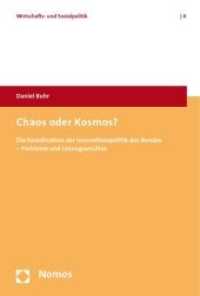- ホーム
- > 洋書
- > ドイツ書
- > Humanities, Arts & Music
- > Philosophy
- > general surveys & lexicons
Full Description
In this book, Justin Pack proposes a genealogy of the traditional suspicion of money and merchants. This genealogy is framed both by how money itself has changed and how different traditions responded to money. Money and merchants became heavily debated concerns in the Axial Age, which coincided with the spread of coinage. A deep suspicion of money and merchants was particularly notable in the Greek, Confucian and Christian traditions, and continued into the Middle Ages. These traditions wrestled with a new dialectic of purity that also appears with the widespread use of money. How were these concerns dealt with politically, socially and philosophically? How did they change over time? How did medieval Europe deal with money and how did this inform modern governmentality? To answer these questions, Pack turns to Hanna Arendt's work. Arendt argues that one of the outstanding characteristics of our time is thoughtlessness. This thoughtlessness is related to how modern life, especially under neoliberalism, is increasingly structured by abstract systems, abstract calculative rationality, abstract relations, and the profit motive. Money both drives and embodies this machinery. The hyper-complex abstract systems of modernity discourage, to use Arendtian terms, "thinking" (wonder, questioning everything) in favor of "cognition" (problem solving). Too often the result is thoughtless cognition—the ability to make things more productive and efficient paired with the incapacity to question and challenge the implications and morality of these systems.
Contents
1 Introduction.- 2 Money, Myths, and Thoughtlessness.- 3 The Neolithic Revolution: From Social Currencies to Debt.- 4 The Axial Age.- 5 Animist Ontologies, Abstraction, and Slavery.- 6 Mastering Money: Usury, Governance and Science in Medieval Europe.- 7 The Modern Attacks on the Traditional Suspicions of Money and Merchants.- 8 Against Homo Economicus: Mauss and Gift Cultures.- 9 The Hermeneutics of Suspicion and Contemporary Cynicism.- 10 Money and Thoughtlessness: Abstraction, Quantification, Adiaphorization.- 11 Conclusions.







